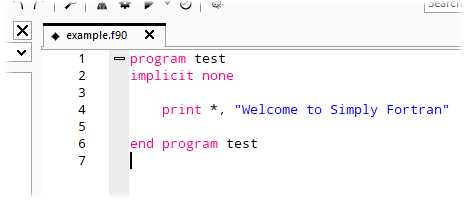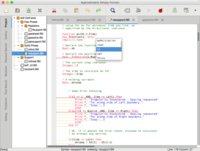
Such a language does not exist.Erlang is a good example of a scalable language. It was designed from the ground-up to support massively parallel, (soft) real-time, non-interfering threads with a clean message passing mechanism. The language eco-system was designed for near 100% uptime with in-place upgrades.What makes a language scalable is whether or not it gets in your way when you want to move from running a single thread on a single node to multiple threads on many nodes. There's also spaghetti inheritance in C++ and Smalltalk, spaghetti call trees in languages where a ten line function is viewed as being too long. And of course holey lasagna, leaky ravioli, and a host of other kinds of bad pasta code. These misfeatures argue against scalability.Is the language a good language for authoring legacy code?Far too many large projects find they need to hire an ex-employee as a consultant because the original author is the only person who has even the slightest chance of understanding the code. A language that is good for authoring legacy systems is not a good choice as a scalable language.Large systems are inevitably written by people who somehow manage to find all of the flaws in the implementation language.
Simply fortran target fails how to#
Project managers of a large, complex system can choose from two classes of people to author the system: Computer scientists who are clueless of the problem domain or domain experts who are clueless about how to write code well. They can't use people who can live in both worlds because such people are few in number and would destroy the company's pay scale. Simply Fortran Target Fails Code That Was#.The answer might come back when the universe ends. Performance doesn't matter, until it does matter. When it does matter, performance can be paramount. A language that shuns addressing performance issues is not scalable.Does the language invite bad programming techniques?Perl invites programmers to write write-only code. FORTRAN (Fortran much less so) invited programmers to write spaghetti code. Std::isteam::operator>).A program written 20 years ago in Fortran or Lisp has a good chance of being compilable and runnable today. Python and scala are not scalable in this sense.

Simply fortran target fails upgrade#
Upgrade to the latest and greatest and you may well break code that was written last week.The first computers were programmed at the bit level (ENIAC) or machine level (UNIVAC-1). Six women were capable of programming the ENIAC.

Simply Fortran Target Fails Code That WasThose six women have been recognized by multiple organizations for this incredible feat. Compiling and linking manually just works fine: gcc6 -c getkey.c gfortran6 -Wl,-rpath/usr/Pascal exemplifies this problem. Not scalable in this sense.Visual Basic is not scalable in this sense. You delay the start until youre comfortable with the rate an average person has failed.Visual Basic is an outlier in this sense in that it consistently exhibits an utter lack of consistency. They make saves until they fail, so if youre willing to wait 1 minute before questions are asked, and they have a 50/50 chance, they have a 1/1024 of having not failed yet. If youre willing to wait 2 minutes, its a 1/1048576 chance they havent failed.GEMPACK programs may emit warning or error messages that refer you to sections. A simple language in which to describe and document the equations of your.There is no such thing as a scalable language.

Every language to date fails in some regard.the Simply Fortran debugger for similar functionality.

Subroutine pdata(icn,con,Iter8) dimension icn(50) character3 path character11 fullpath character30 fname character8 numb1 character2 numb2 character2 numb3 character3 numb3L character100 ShellCommand logical4 exists integer4 k1,k2,k3 integer8 Iter8, iprod8 Write(6,)'Enter.


 0 kommentar(er)
0 kommentar(er)
